Climate change threatens water reserves: New solutions for the future!
The University of Siegen, represented by Professor Dr. Friederike Welter advocates innovative solutions in water management.

Climate change threatens water reserves: New solutions for the future!
The Research and Innovation Expert Commission (EFI) presented its annual report to the federal government today. The document, in which Professor Dr. Friederike Welter from the University of Siegen plays a central role, emphasizes the urgent need for new innovations in the German water management. Given the challenges posed by climate change, Germany is increasingly confronted with water shortages. These will vary regionally and seasonally, making water distribution more complex.
In order to counteract the impending usage conflicts in the water industry, the EFI recommends both technological and institutional innovations. However, many water companies are skeptical about introducing new technologies because they need to ensure water supplies at acceptable prices. Current residues in water quality, which are influenced by fertilizers, pesticides and microplastics, require immediate action to sustainably secure water resources.
Strategic approaches to water management
The EFI suggests setting up real-world laboratories to test and optimize water management innovations. This is particularly important because precise knowledge of water abstraction rights and water prices is essential for the development of new technologies. Rapid digital data collection is also recommended to streamline water management and make it more efficient.
A systematic approach to adjusting water abstraction fees is necessary to take into account the challenges of water scarcity and the associated external costs. Dynamic pricing in water-intensive industries could be an effective means of improving water efficiency.
A comprehensive approach is also being pursued as part of a new scientific initiative in Austria entitled “Water in Climate Change – Our Water Management 2050+”. This research aims to examine the impacts of climate change on water balances through 2026. Particular consideration is given to the rise in temperatures, the increase in extreme weather events and the postponement of snowmelt.
European perspectives and innovative solutions
At the European level, institutions reiterate the urgency of securing water supplies in the wake of climate change. The EU Water Framework Directive plays a central role here by requiring member states to systematically protect and develop freshwater resources. This policy covers everything from rivers and lakes to coastal waters and forms the basis for sustainable water use strategies.
It also supports European innovation projects such as ECWRTI, iMETland and REMEB, which are developing future solutions for wastewater treatment and water recycling. Among other things, the CENTAUR project aims to better manage flood events in urban areas, while SUBSOL explores new approaches to water management in coastal regions.
Overall, the approaches both in Germany and Austria and at the European level show that the protection and sustainable use of our water resources represent a shared challenge. While innovative technologies play an important role, fundamental institutional reforms are also required to meet increased demands. Sustainability in the water sector will therefore become both an ecological and economic key issue in the coming years.

 Suche
Suche
 Mein Konto
Mein Konto